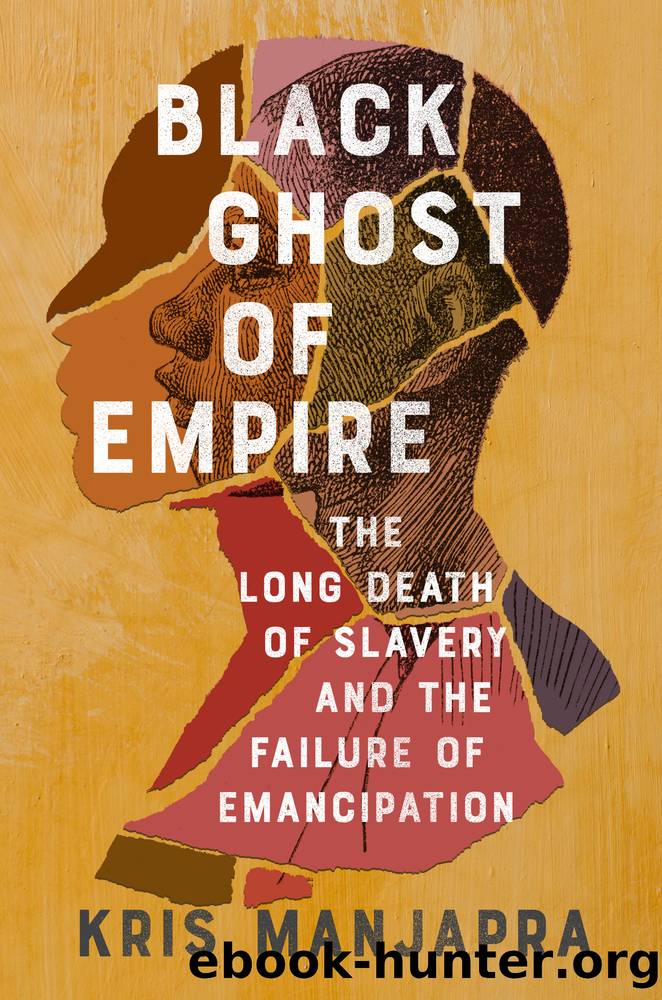Black Ghost of Empire by Kris Manjapra

Author:Kris Manjapra
Language: eng
Format: epub
Publisher: Scribner
Published: 2022-04-19T00:00:00+00:00
A WARRING KIND OF FREEDOM
As W. E. B Du Bois once said, the âNorth was not Abolitionist.â21 The Civil War did not begin as a war over the abolition of slavery. The North was âoverwhelmingly in favor of Negro slavery, as long as it did not interfere with Northern moneymaking.â The causes of the Civil War are to be found in two competing visions of the American frontier: one intent on acquiring the âfree soilâ of the West and integrating the continent into a Free Trade empire, and the other intent on the expansion of the neo-mercantilist Cotton Kingdom across the Caribbean and into South America. This futuristic kingdom could thrive through state protection of slavery on land and at sea, and the expansion of the Atlantic traffic in captive African peoples. These two visions of the frontier and of the future, one Liberal and the other Mercantilist, one anchored by Northern banks and factories, and the other by the Southern plantation machine, stoked a war that resulted in hundreds of thousands of deaths. The Civil War, at its origin, had nothing to do with slavery and abolition. It was a struggle over the future of the American frontier.
After it broke out, and as it continued, the war increasingly transformed into a struggle over emancipation. The actions of masses of black fugitives, soldiers, and advocates played a major part in making the Civil War about slavery. As Frederick Douglass resonantly put it in 1865, âThe Negroes of the South⦠comprehended the genius of the war even before you did.â22 They worked in and through the chaos of war emancipation to assert their core demands for voting rights, education, civil protections, and reparations. In sum, all of these demands stemmed from the demand for social reciprocityâthe demand to be able to touch the social order and its representative bodies of statecraft, and to be touched by them.
A close look at the chaos of the war emancipation leads us to Abraham Lincoln, the Civil War president. Although the Civil War did not begin as a battle over slavery, Lincolnâs actions, starting in the first months of the war, already began contributing to the patterns of starts and stops, of half freedoms and recurring compromises, on the crooked path to the Emancipation Proclamation. Lincoln, fifty-two years old when he took office one month before the raid on Fort Sumter, had spent many years studying the gradual and compensated emancipation processes of the US North and Britain. He, like other young politicians from Illinois, believed that a peaceful transition from slavery to postslavery could be engineered through slave-owner reparations, the âapprenticeshipâ of freed black people, as well as the deportation of black people to colonies overseas. The expulsion of black people become a mainstay of the âconservative emancipationâ movement. Key representatives included Kentucky senator Henry Clay, one of the founders of the American Colonization Society, and one of Lincolnâs mentors. Henry Clayâs cousin Cassius Clay also believed the deportation of African American people to Africa and to Latin America would help preserve the civic peace.
Download
This site does not store any files on its server. We only index and link to content provided by other sites. Please contact the content providers to delete copyright contents if any and email us, we'll remove relevant links or contents immediately.
| Civilization & Culture | Expeditions & Discoveries |
| Jewish | Maritime History & Piracy |
| Religious | Slavery & Emancipation |
| Women in History |
Cecilia; Or, Memoirs of an Heiress — Volume 1 by Fanny Burney(32540)
Cecilia; Or, Memoirs of an Heiress — Volume 2 by Fanny Burney(31936)
Cecilia; Or, Memoirs of an Heiress — Volume 3 by Fanny Burney(31927)
The Secret History by Donna Tartt(19034)
Sapiens: A Brief History of Humankind by Yuval Noah Harari(14358)
Leonardo da Vinci by Walter Isaacson(13310)
The Radium Girls by Kate Moore(12013)
Sapiens by Yuval Noah Harari(5363)
How Democracies Die by Steven Levitsky & Daniel Ziblatt(5211)
The Wind in My Hair by Masih Alinejad(5085)
Homo Deus: A Brief History of Tomorrow by Yuval Noah Harari(4898)
Endurance: Shackleton's Incredible Voyage by Alfred Lansing(4761)
Man's Search for Meaning by Viktor Frankl(4573)
The Silk Roads by Peter Frankopan(4525)
Millionaire: The Philanderer, Gambler, and Duelist Who Invented Modern Finance by Janet Gleeson(4461)
The Rape of Nanking by Iris Chang(4200)
Joan of Arc by Mary Gordon(4098)
The Motorcycle Diaries by Ernesto Che Guevara(4087)
Stalin by Stephen Kotkin(3956)
